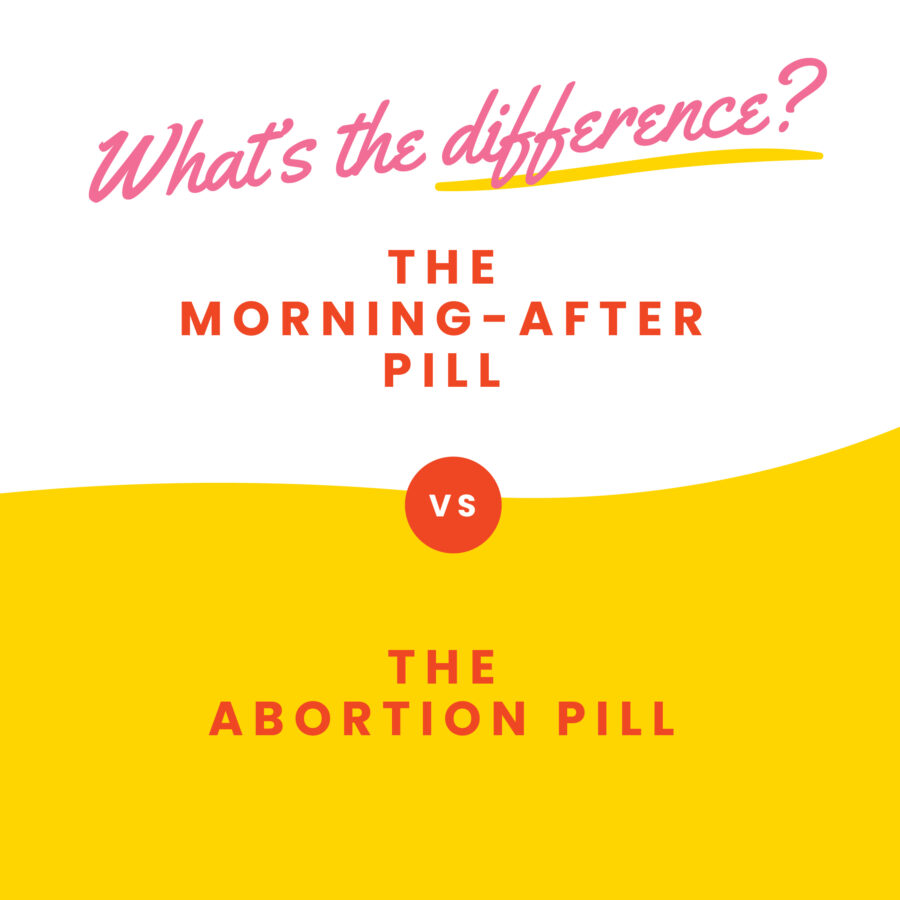When it comes to your sexual and reproductive health, if you’ve got questions, we’ve got answers. Here’s a question that comes up a lot: ‘What’s the difference between the abortion pill and the morning-after pill?’ This topic sometimes causes confusion, but we’re here to help clear it up.
First things first: the morning-after pill is *not* the same thing as the abortion pill. The morning-after pill will not end an existing pregnancy.
The morning-after pill is also called emergency contraception. Emergency contraception does not end a pregnancy. It only works if you are not pregnant. The abortion pill is also called medication abortion. Medication abortion is a treatment that is used to end a pregnancy. Even though they may sound similar, they are completely different. Let’s break it down.
Emergency Contraception
Emergency contraception is a type of birth control you can use up to 5 days after unprotected sex to avoid getting pregnant. There are a few different kinds of emergency contraception.
The most common type of emergency contraception is the morning-after pill and there are two different types. The sooner you take the morning-after pill after unprotected sex the better. Ulipristal, which has the brand name ella, can be used up to 5 days after unprotected sex. You’ll need a prescription from a doctor or other health care professional. Heads up — ella may not work as well if you weigh 195 pounds or more. Read on for more options.
The other type of emergency contraception pill is sometimes called ‘Plan B.’ It also comes in generic forms with a variety of different names. This medicine is available without a prescription in pharmacies, other stores, and online. Not all places carry the over-the-counter emergency contraception pill, so you may want to call ahead to see if they have it. You can take it up to 72 hours after having unprotected sex but the sooner you use it, the better it works. This option may not work as well if you weigh 165 pounds or more.
The morning-after pill works mostly by preventing or delaying ovulation. If a fertilized egg has already implanted in your uterus, you are pregnant. If you are pregnant, the emergency contraception will not end your pregnancy. Taking emergency contraception will also not harm your pregnancy.
You can get emergency contraception pills ahead of time. That way you always have them handy if needed. You can buy them without a prescription or ask your doctor for a prescription. Many insurance plans will cover emergency contraception.
Morning-after pills don’t cause long-term side effects, and they won’t change your ability to get pregnant in the future. They work really well to prevent pregnancy, especially in a pinch. But the best way to prevent pregnancy is to find a regular birth control method that works for you. At Sunny, we’ll be happy to talk to you about different birth control options.
Another type of emergency contraception is an intrauterine device (IUD). Yup, the same IUD that’s used for birth control! An IUD is a small T-shaped device that is put in your uterus by your doctor or other healthcare professional. This is the most effective form of emergency contraception. And it works for people of any weight. You can use it up to five days after unprotected sex. One nice thing about the IUD is that you can keep it in for super convenient and effective ongoing birth control. You can keep the copper IUD for up to 12 years! Some other types of IUDs can last up to 8 years. Or you can have it removed whenever you are ready. Check with your doctor or nurse, since not all types of IUDs are used as emergency contraception.
Medication Abortion
Medication abortion, also called the abortion pill, is a way to end an early pregnancy. Unlike emergency contraception, medication abortion doesn’t prevent a pregnancy. Instead, it ends a pregnancy after it’s started.
There are two different options for medication abortion. Both types are safe and work well. Ask your doctor or nurse if you have questions about the different types of medication abortion
1. Using mifepristone and misoprostol to have an abortion: In this option, two different medicines — mifepristone and misoprostol — are used. Mifepristone blocks a hormone your body needs to continue a pregnancy. Misoprostol causes bleeding and cramps that empty the uterus.
2. Abortion with only misoprostol: In this option, you take 3-4 doses of misoprostol. This causes cramping and bleeding that empty the uterus.
At Sunny, we provide medication abortion for people 16 and older who are up to 11 weeks pregnant. We’ll ask you a few questions about your health. It should take only a few minutes to fill out our questionnaire. Within one business day, a doctor will review your medical history. If you are medically-eligible, your medicines will be shipped right to you. The cost is $175, and we only charge you if you are eligible and if you decide to continue. Expedited shipping is available for an extra charge.
Your kit will arrive in a discreet plain-marked package, with all the instructions that you need to take the medications. Our care team offers support, before, during, and after your treatment by chat, text, and our secure platform.
Bottom Line
The morning-after pill can be a great option if you’ve had unprotected sex within the last 5 days and want to prevent pregnancy. But it won’t work if you are already pregnant. If you are pregnant and want to end a pregnancy, you may be able to get the abortion pill or to have an abortion procedure.
You can check out Abortion Finder to find a verified abortion provider near you.

